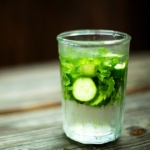 This summer, thousands of thirsty people might be at a loss for what to drink. Soda, long a staple of the American diet, has faced recent widespread demonization in the media for its role in the obesity epidemic, prompting nationwide discussion about scaling back soda consumption and new policies to control portion sizes.
This summer, thousands of thirsty people might be at a loss for what to drink. Soda, long a staple of the American diet, has faced recent widespread demonization in the media for its role in the obesity epidemic, prompting nationwide discussion about scaling back soda consumption and new policies to control portion sizes.
Patients of gastric bypass and Lap Band in Salt Lake City already know how dangerous soda can be for weight loss, but where are we to turn for flavorful refreshment when the Utah heat dries our thirsty mouths? Though water should always be your first choice for hydration, we often crave something more substantial. Fear not—there are many beverage alternatives out there that have all the flavor with none of the calories, and many of them offer other benefits to boot.
Flavor-infused Water
Despite popular belief, water doesn’t have to be tasteless and boring. You can infuse water with the flavor of some of your favorite fruits and veggies very easily. Cut up some cucumber, mint, lemon or lime, add it to a pitcher of water and let it stand for a few hours before enjoying. You can experiment with all kinds of different flavors in this way. You might be surprised at what an impact a bit of flavor has on H20.
Unsweetened Tea
A longtime summer favorite, unsweetened iced tea offers natural refreshment and a subtle flavor. Each variety—black, green, white, red—is completely calorie-free and offers its own unique taste. Tea also contains antioxidants that fight off the cellular damage of free radicals and can help prevent cancer. For extra credit, add a sprig of mint or a wedge of lemon or lime. This will boost the flavor and the antioxidant content without adding calories—just make sure not to add sugar or any other sweetener or you may negate the benefits.
Vegetable Juice
Though many fruit juices contain just as much sugar and calorie content as your typical soda, drinking vegetable juice will help you avoid those empty calories while also adding some nutritional value to your refreshment. In fact, juicing your vegetables will help your body absorb nutrients quicker and more effectively, as the veggies are essentially pre-digested. Some important enzymes contained in raw vegetables are actually destroyed by heating them, so drinking fresh vegetable juice can give you benefits you might miss out on after cooking and eating a plate of veggies. For the biggest benefit, your vegetable juice should be primarily composed of dark green veggies like spinach, kale and green leaf lettuce, but you can rotate between many different vegetables to try different flavors. You can also add different herbs and greens, like cilantro, parsley or mustard greens to spice things up a bit.


